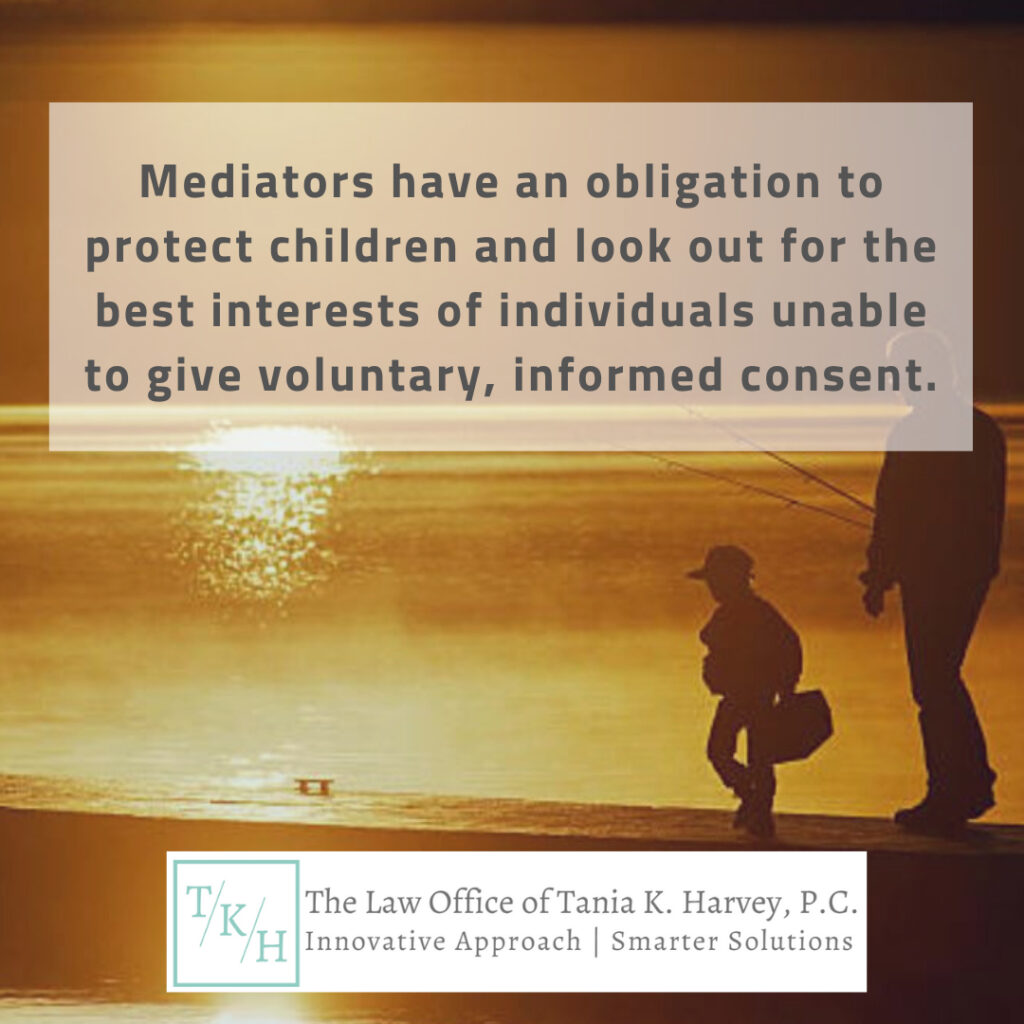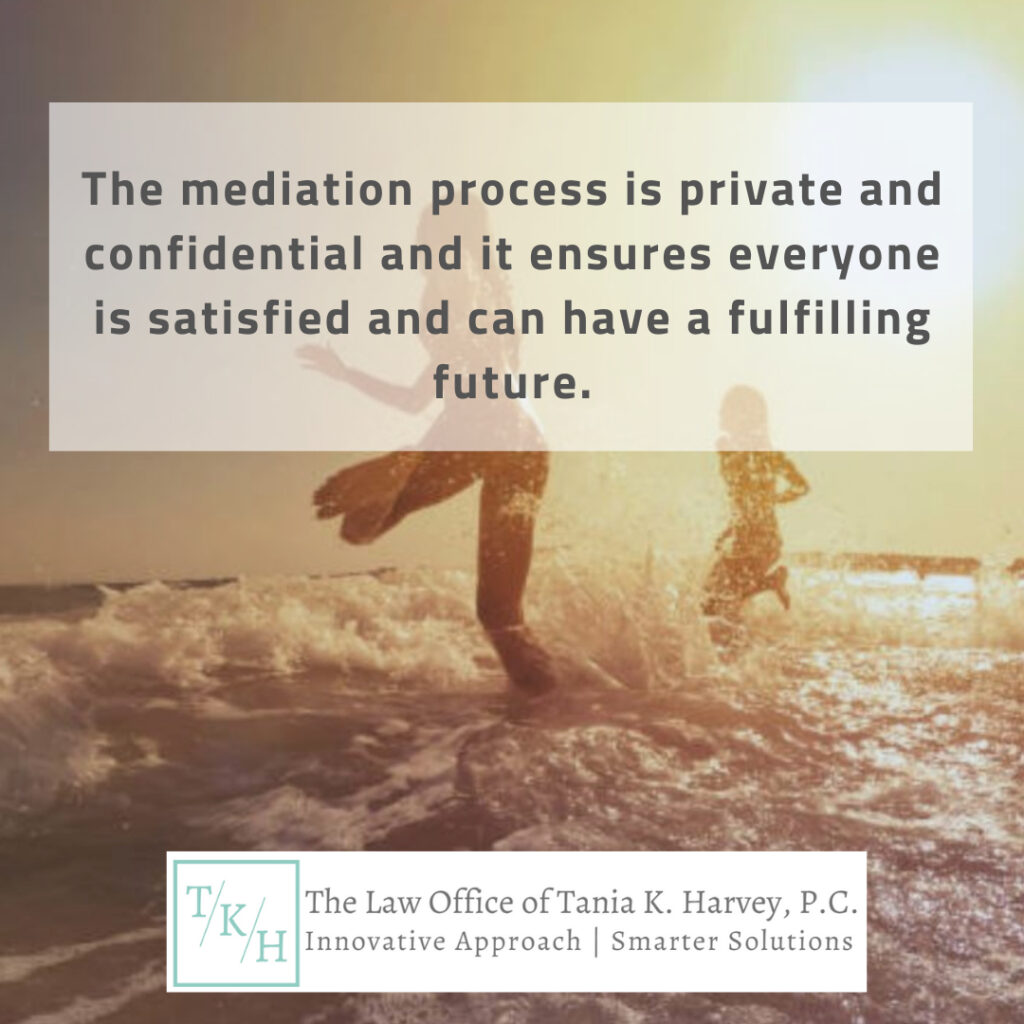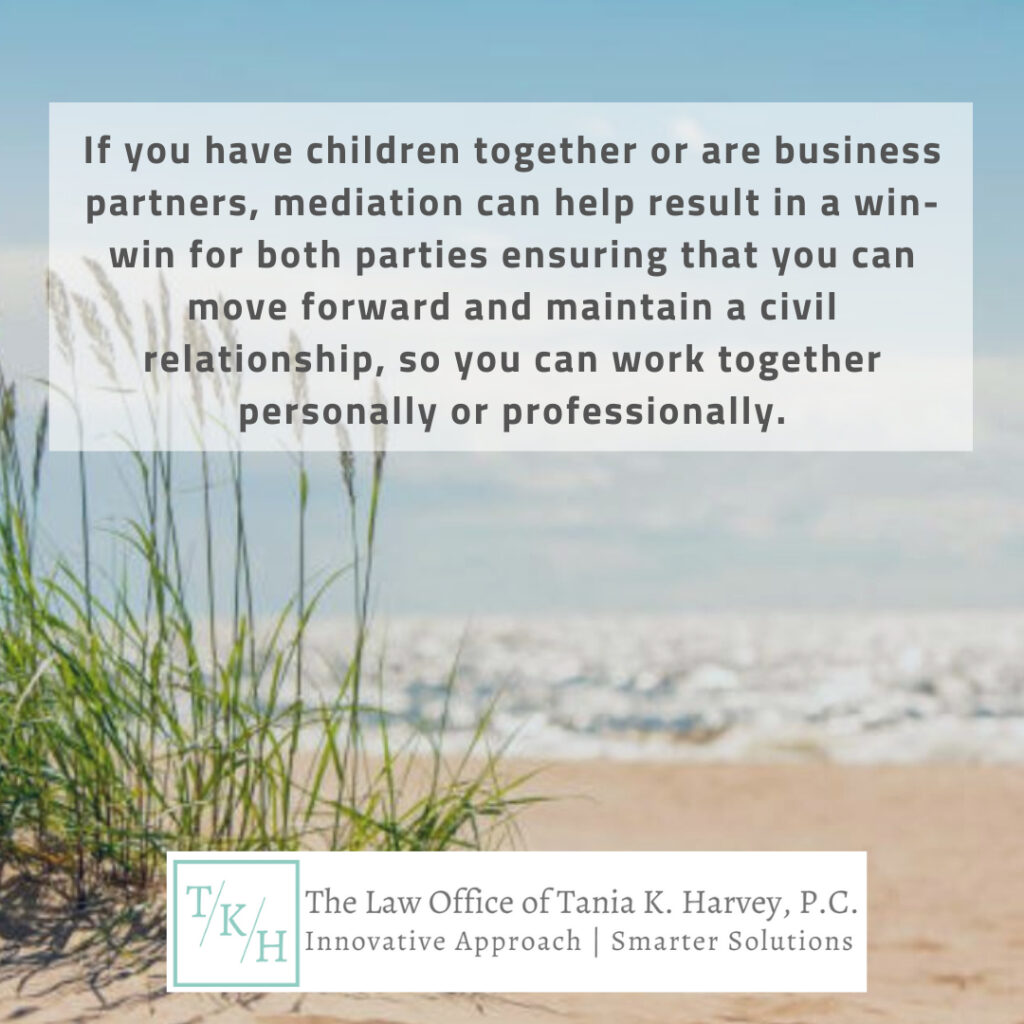Mediation is another innovative approach to divorce and is often chosen by spouse’s who want to, or need to, preserve an amicable personal or working relationship. If you have children together or are business partners, mediation can help result in a win-win for both parties ensuring that you can move forward and maintain a civil relationship, so you can work together personally or professionally.
In the mediation process, a neutral third party, the mediator, assists both parties in reaching a satisfactory settlement for everyone. It typically takes two days to complete the process (although every case facts are difference and some may require more time). During that time, the mediator will help you to identify your primary goals, to identify obstacles, and to develop strategies to address any obstacles. The whole thing is private and confidential with the end result being a smarter solution that you played a part in achieving rather than a Judge who does not know you or your partner. It ensures everyone is satisfied and you can proceed to the next stage of your life.
What is a mediator and what do they do?
A mediator is a trained professional with high standards of competence and expertise and numerous techniques to resolve disputes amicably. They are guided by a set of rules and ethics set forth by the Illinois General Assembly. The primary responsibility of a mediator is to remain impartial. This impartiality allows the him/her to protect the welfare of the individuals and families they represent.
Mediators do not have the power to render a decision or to force the parties to accept a settlement. What they do have is the skill to manage disputes and empower you and your partner to formulate and agree to mutually beneficial solutions.
Mediators have an obligation to protect children and look out for the best interests of individuals unable to give voluntary, informed consent. In addition, it is the his/her job to make sure all parties are fully informed about any issue that is being discussed. Also, the mediator needs to ensure that all parties understand the implications or consequences of any options being discussed.
Although the mediator is neutral, that person still has an obligation to help the parties create fair solutions. They will not allow either party to be manipulated or coerced into a decision that is completely unreasonable. The goal is to finish with a resolution that is reasonable for everyone and that allows you to move forward.

What does the process look like?
The first thing you and your partner want to determine is whether you want to only use a mediator or whether you want to have attorney assisted mediation.
Deciding to work with only a mediator will save you money because they are the primary person you will work with in the process. In the end, they will provide you with the agreed upon terms in a Memorandum or Understanding (MOU). From here, you will take the MOU to an agreed upon attorney or you will take them to independent attorneys. They will review the terms, formally write them up, and file them in court. This means that an attorney (or attorneys) are only paid for the time it takes to write up the agreement and make the court filing.
If you decide it is in your best interest to have an attorney present this is called attorney assisted mediation. This is common when there may be a power imbalance in the relationship and a party may not feel comfortable negotiating on their own behalf. This could also occur when on party does not trust the other.
Having an attorney present also allows you to have “on-site” legal guidance at the time, as the mediator can not explain the law to you. Although many believe this is more costly, sometimes it can save money if you do not have to take an agreement to an attorney after the fact and have the provisions you agreed to explained in legal terms.

Once you have decided what is best for you and your partner, you will move forward to the next steps. The mediator will begin by making introductions and an opening statement. The opening statement reinforces the mediators neutral role, reviews the guidelines, and sets a protocol and timeline for the meeting.
After the opening statement, each side has the opportunity to tell their story and provide their perspective on all key issues that need to be discussed. This allows each person the opportunity to be heard and it allows the mediator to gather more information to determine where there is common ground and what contentious issues may be present.
Once each person has presented their case, the mediator may ask more open-ended questions, may repeat back key ideas, or may summarize some of the main points he/she heard. This again, deepens the mediator’s understanding of the issues and helps both parties start to develop an awareness of how their spouse feels and what their spouse is thinking. At this point, the mediator also tries to find common goals and will articulate those, so the process can move forward.
At the next stage, the mediator starts to guide you through bargaining, generating solutions, and reaching agreements. It is likely that you will begin with issues where there is common ground and where you can reach an agreement pretty quickly. For more contentious issues, the mediator will use a variety of strategies to help you and your spouse work towards finding common ground.
A mediator may have you commence in a brainstorming session to explore numerous potential solutions or options to an issue. The mediator may hold short, private sessions with each of you to discuss any underlying problems or fears related to an issue. The mediator may present a proposal for you and your partner to discuss or take turns modifying.
Because your mediator is familiar with all parties involved and the intricacies of the case, he/she will be able to utilize the strategy that will work best in your situation to help everyone agree upon reasonable solutions to resolve your case. Once an agreement is reached, the mediator will provide you with all agreed upon terms. At this point, those terms will be reviewed and written up by an attorney and filed in court.

What if the mediation process doesn’t work?
According to The American Arbitration Association, over 85% of all mediations result in a settlement. For those 15% that did not resolve their case, there is no legal penalty. However, you and your partner will have to make another decision about what process you want to engage in to move forward.
At our firm, Tania K. Harvey is a trained and experienced mediator. She has extensive experience facilitating meditation processes that involve complex family, personal, and business issues. She is skilled at educating all involved parties and facilitating an efficient and respectful session. Most importantly, she has employed numerous strategies that help people effectively negotiate with their partners and achieve smarter solutions that are in the best interest of all parties involved. These skills also allow her to be effective in attorney assisted mediation as the mediator or the attorney.
